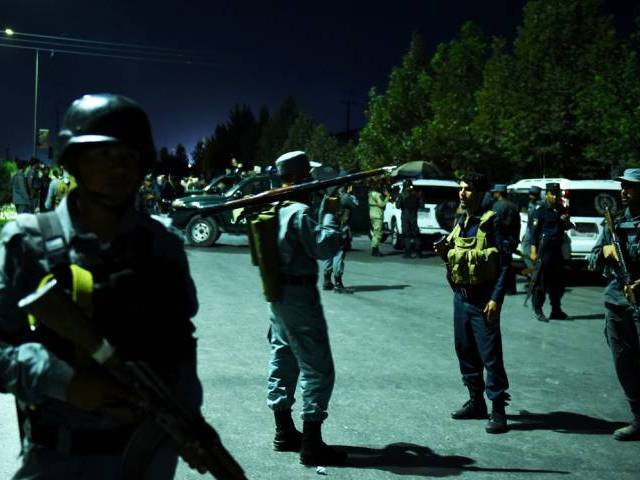A deadly spiral in Afghanistan
Attack on American University in Kabul exacerbated the already parlous relations between Pakistan & Afghanistan

An Afghan security personnel (C), holding a rocket-propelled grenade, stands guard near the site of explosion that targeted the elite American University of Afghanistan in Kabul on August 24, 2016. PHOTO: AFP
Adding to the sense of insecurity, there are signs of a convergence between elements of the Afghan Taliban and fighters of the Islamic State (IS). The US State Department is reportedly “aware” of an emerging alliance between the two groups which in Afghanistan at least have been opposed to each other and fought bitterly. It appears that a ‘patchwork’ ceasefire between the two groups has been operant for the last two months. Given that the Afghan Taliban form a parallel government in the southeast of the country, which borders Pakistan, this will raise concerns in the security establishment on this side of the border as well. Operation Zarb-e-Azb has been effective in terms of clearing Taliban from most of Fata; but it has also decanted any number of well-armed and trained Taliban into Afghanistan and into the very area that is now being viewed as one where two hitherto opposing forces are moving towards an alliance. The IS is not known for forming allegiances with any other group, and other extremist groups have been wary of forging alliances with it.
Thus if substantiated this move may indicate a shift of position within extremist movements. Both IS and the Afghan Taliban are in their own right powerful if unequal organisations, with the latter being very much the senior partner in any rapprochement between the two groups. Combining human resources and materiel informally rather than under a declared joint banner would represent a significant shift in the balance of extremist power. Linked to the foregoing, IS entryism in Pakistan is inevitably going to lead to cross-pollination over the borders, which ultimately is bad news for both Afghan and Pakistani governments. It is possible to see this shift as a natural evolution of relationships between groups that despite having underlying differences are prepared to put them on hold to advance a wider goal.
Taking the disparate elements together, a picture of a crumbling and insecure Afghanistan emerges. Non-state actors are on the front foot, the government making advances almost nowhere and for some analysts, the future in Afghanistan is Taliban. We hope they are wrong.
Published in The Express Tribune, August 28th, 2016.
Like Opinion & Editorial on Facebook, follow @ETOpEd on Twitter to receive all updates on all our daily pieces.














COMMENTS
Comments are moderated and generally will be posted if they are on-topic and not abusive.
For more information, please see our Comments FAQ